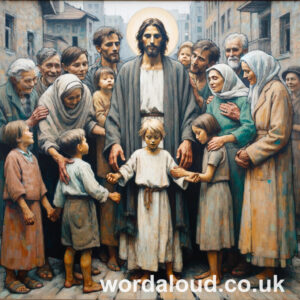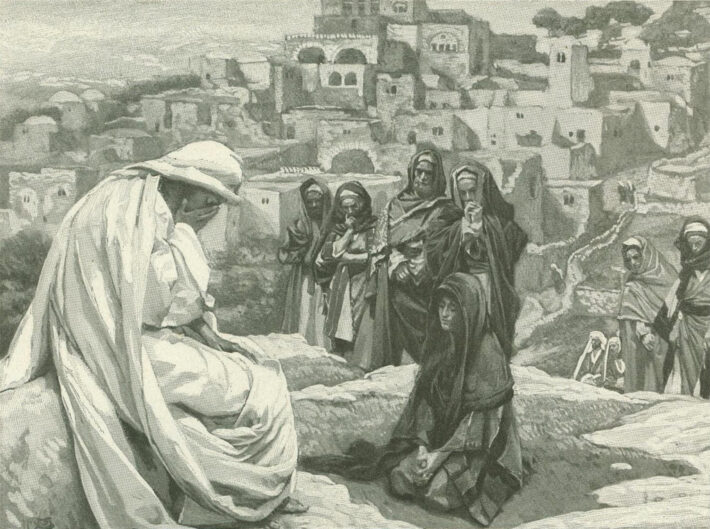Christian Art | Jesus Wept For The Destruction Of Jerusalem
Luke 19: 41-44 – Week 33 Ordinary Time, Thursday (King James Audio Bible KJV, Spoken Word)
41 ¶ And when he was come near, he beheld the city, and wept over it,
42 Saying, If thou hadst known, even thou, at least in this thy day, the things which belong unto thy peace! but now they are hid from thine eyes.
43 For the days shall come upon thee, that thine enemies shall cast a trench about thee, and compass thee round, and keep thee in on every side,
44 And shall lay thee even with the ground, and thy children within thee; and they shall not leave in thee one stone upon another; because thou knewest not the time of thy visitation.
Jesus is so very sorry for a city and a people he loves that he must weep at the sight of Jerusalem. Here is the centre of Jewish faith, while the Jews are the people to whom he has directed most of his teaching, and they are the first chosen people of God.
There is such tragedy here. Peace could be so very attainable, if only they knew and could accept the ways of living at peace, but they cannot. Nor are they alive to presence of Jesus among them. It seems inevitable: just as prophets of old were rejected, so too will Jesus be.
Jesus foretells the Jewish revolt and the subsequent destruction of Jerusalem. He has tried to instil in his Jewish listeners an ethos of peace and humility, together with an entirely new notion of the Kingdom of God. He has taught an end to pride and sectarian rivalries. He has told his listeners to give unto Caesar what is Caesar’s and to God’s what is God’s – a kind of separation of church and state, of the religious from the secular.
The memory of the Maccabean revolt has, though, lingered in Jewish consciousness, and pride renders the Roman subjection intolerable. Some Jews are going to rebel. There will be infighting, the rebellion will be crushed, and the Temple razed, never to be rebuilt, and there will be great bloodshed. The Jewish faith will be forced to change, to reconstruct itself in new ways, and Christianity also will be affected: while the Christians actually flee Jerusalem during the rebellion, the loss of the Temple marks a diminishing of Jewish Christianity – of the church first led in Jerusalem by James the brother of Jesus – such that henceforth a Pauline Christianity will predominate, including converts of the diaspora but also strongly geared to Gentiles.
Christ’s is an emotional, human response to this great tangle of history. We might find ourselves alerted in these verses to just why it is that Christ’s offering of himself as the sacrificial lamb must be here in Jerusalem. It seems the whole of salvation history is gathered together here at this nexus point. It seems good also, that rising above the upheaval, there is the overarching figure of the cross, victorious, all-conquering, eternal.
See also: Jesus Wept | Death And Resurrection Of Lazarus | Love Revealed By Jesus Christ | Humanity Of Jesus
BY the rivers of Babylon, there we sat down, yea, we wept, when we remembered Zion.
We hanged our harps upon the willows in the midst thereof.
For there they that carried us away captive required of us a song; and they that wasted us required of us mirth, saying, Sing us one of the songs of Zion.
How shall we sing the Lord’s song in a strange land?
If I forget thee, O Jerusalem, let my right hand forget her cunning.
If I do not remember thee, let my tongue cleave to the roof of my mouth; if I prefer not Jerusalem above my chief joy.
Remember, O Lord, the children of Edom in the day of Jerusalem; who said, Rase it, rase it, even to the foundation thereof.
O daughter of Babylon, who art to be destroyed; happy shall he be, that rewardeth thee as thou hast served us.
Happy shall he be, that taketh and dasheth thy little ones against the stones. (Psalm 137)

![]()
King James Audio Bible | Endnotes
Jesus Wept Meaning For The Destruction Of Jerusalem
Jesus weeps over Jerusalem, as he foretells its destruction at the hands of the Romans. This event is significant not only for its historical context but also for its theological and spiritual implications.
Elsewhere in the New Testament, the Gospel of Matthew speaks too of the destruction of the Temple in Jerusalem, which would occur in AD 70, and the signs of the end times that would precede it. In Matthew 24:3-8, Jesus’ disciples ask Jesus about the signs of his second coming and the end of the age. Jesus responds by speaking of wars, famines, earthquakes, and other disasters as the birth pangs of a new age, which would culminate in the coming of the Son of Man.
Similarly, the book of Revelation depicts the destruction of Jerusalem and the Temple as a sign of God’s judgment upon the world, and the beginning of a new era of salvation. In Revelation 11:1-2, John is told to measure the Temple in Jerusalem, but to leave out the outer court, which has been given over to the Gentiles. This symbolizes the fact that the Temple, and by extension, the entire city of Jerusalem, is about to be desolated by its enemies.
However, the destruction of Jerusalem is not just a historical event in the Bible; it also holds spiritual and theological significance. It speaks to the consequences of disobedience and rebellion against God’s ways, as well as the compassion and love of God for His people, even in the face of their rejection of Him.
In Luke 19:41-44, Jesus weeps over Jerusalem because he knows the devastation that will befall its people. Jesus speaks of the siege that will come upon the city, the destruction of the temple, and the slaughter of its inhabitants. Jesus laments the fact that they did not recognize the time of their visitation, when the Messiah had come to them. This weeping is a profound expression of Jesus’ love and compassion for his people, even in the face of their rebellion.
Throughout the Bible, we see the consequences of disobedience and rebellion against God’s ways. The prophets of the Old Testament warned of God’s judgment upon Israel if they continued to disobey his commandments. The prophet Jeremiah spoke extensively about the impending destruction of Jerusalem, which was ultimately fulfilled in 587 BC when the Babylonians conquered the city and destroyed the Temple. Similarly, the prophet Ezekiel foretold the destruction of Jerusalem and the Temple, as well as the restoration that would come after the exile.
In the New Testament, the Apostle Saint Paul speaks of the consequences of sin and disobedience in his letters. In Romans 6:23, Saint Paul writes: ‘For the wages of sin is death, but the gift of God is eternal life in Christ Jesus our Lord.’ This verse underscores the importance of recognizing our sinfulness and turning to Christ for salvation. Similarly, in Galatians 6:7-8, Saint Paul warns that ‘a man reaps what he sows. Whoever sows to please their flesh, from the flesh will reap destruction; whoever sows to please the Spirit, from the Spirit will reap eternal life’. In these passages and others, Saint Paul emphasizes the reality of judgment and the importance of repentance and faith in Christ for salvation.
Pope Francis has said: ‘Jesus wept over the city of Jerusalem, because it had not recognized the time of its visitation. We too, Lord, we too have not recognized it, your visit among us.’ Pope Francis highlights the continuing relevance of Jesus’ tears for people today. Pope Francis is emphasizing that we must recognize the signs of God’s presence in our lives and respond accordingly, turning away from sin and embracing the message of salvation that Jesus brings. Just as Jerusalem failed to recognize its opportunity for redemption, so too we can miss the opportunity to receive God’s grace and mercy if we are not vigilant and attentive to His presence in our lives. The weeping of Jesus over Jerusalem is a call to repentance and a reminder of the urgency of turning to Jesus in faith, trusting in Jesus’ love and mercy.








